EV charging stations explained
In the UK, over 90% of electric vehicle (EV) charging is done at home. This is usually the cheapest and most convenient way of charging up, but sometimes we need to rely on public charging stations to top up our batteries.
Thankfully, the UK’s charging network is better than ever and constantly improving. From electric car charger home chargers to supermarkets offering free charging while you shop, we’re here to help you figure out charging up both at home and on the road.
There's a very easy to remember equation to work out your approx. charge time;
Battery size (kWh) / Charger power (kW) = Charging time (hours)
However, it's also not an exact science with other factors to also consider when working out how long to charge for, these include:
- how many miles do you need to travel between charging events? (most EV manufacturers recommend that where possible an EV battery should operate between 20% to 80% charge)
- how much charge your electric vehicle has already when you plug it in
- local factors at a public charging station, such as the number of chargers being used at once
- outside temperature and your EV battery temperature
How do you charge an electric car at home?
Typically, home charging happens in one of two ways. Firstly, there’s slow charging, where you can plug your EV into a regular 3-pin plug socket. With a maximum charge speed of 3kW per hour, this means you can charge something like a MG4 EV Long Range which has a 64kWh battery in around 30 hours., when charging from 0% to 100%.
Having the option of using a 3-pin plug can be useful on occasions but at DriveElectric we do not recommend that you use a 3-pin plug socket as your main recharging option at home.
Instead, we recommend that if you have off street parking at home then a professionally installed home charger is by far the best way to recharge an electric vehicle. In most cases in the UK, this provides around 7kWh of power. Using the same MG4 EV Long Range with its large 64kWh battery a full charge from 0% to 100% takes around 10 hours. Significantly faster than a standard 3-pin plug.
There are other benefits of using a dedicated home charger, such as:
- Ability to pair up other low/zero carbon technologies such as solar panels and/or home battery
- Ability to monitor and manage your charging via the smart chargers' phone app
- Ability to use variable/flexible electricity prices from energy providers (i.e. take advantage of cheap overnight electricity tariffs)
It is probably also worth pointing out that it is very rare that drivers need to recharge from 0% to 100% consistently, instead EVs are usually kept in the 'sweet spot' of having between 20% and 80% charge, with drivers topping up their EV overnight while they're asleep!
Sometimes, however, it’s not possible to have a home charging point, while if you’re going on a long journey, you’ll need to find somewhere along the way to plug in.
If you’re wondering how to charge an electric car away from home, it’s time to get acquainted with the UK’s thriving public charging network.
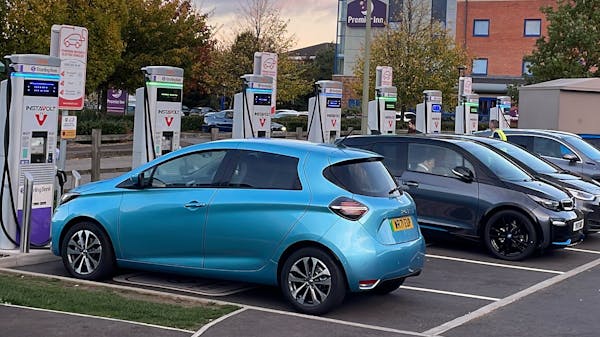
How do electric car charging stations work?
You can find public charge points in car parks, at supermarkets or just at the side of the road in residential areas, as well as at service stations and other places such as cinemas, pubs and restaurants. Every month more public charging stations are added by a wide selection of providers.
Rapid and ultra-rapid charging points are best if you’re stopping on a long journey, as they typically offer speeds between 50kWh and 350kWh. Going back to our MG4 EV Long Range this means if plugged into a 150kWh+ ultra-rapid charger, charge can go from 10% to 80% in just 34 minutes.
There are also superchargers which offer speeds of up to 150kW. Tesla’s charging network for example offers this supercharging capability.
Yet in the race to provide even quicker solutions the latest generation of 'ultra-rapid' chargers are now popping up in locations up and down the UK. These chargers are capable of delivering up to 350kW of charge, so theoretically you could add almost 200 miles of range in around 15 minutes. To put this into perspective, this means you can fully charge a Mercedes-Benz EQC – which has an 80kWh battery that delivers a 230-mile ‘real world’ range – in around half an hour. If you’re pulling over at a motorway service station, your car will be pretty much fully charged by the time you get back from using the facilities and grabbing a coffee or a bite to eat.
Whatever speed you’re able to get, you need to ensure the station you visit is compatible with your car’s connection.
Be it Type 1, Type 2, CCS, Chademo, Commando or Tesla, your EV’s handbook and the charging network provider’s website will give you all the information you need. There are also apps you can use for this, but we’ll get onto that later.
Different companies operate different charging networks, and you may need to download an app, get a swipe card or open an account to use them. It’s a good idea to plan any long journeys or pick out the closest charging stations to your home or work, but this all becomes second nature very quickly. Thankfully many public charging points also accept standard bank cards - but plan ahead!
Charging at motorway service stations
With over 100 motorway service stations dotting the UK, finding the perfect place to recharge—both your car and yourself—can make all the difference.
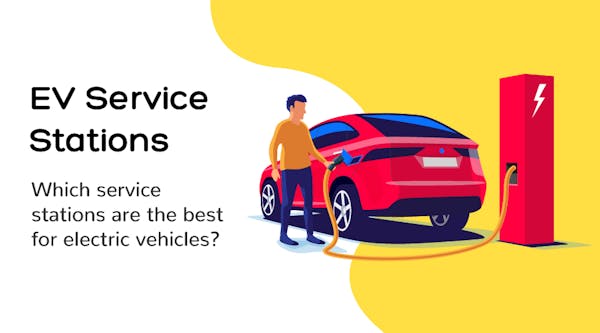
Whether you're a seasoned EV driver with a favorite stop or just looking for the top-rated stations we've got you covered. We've carefully ranked every motorway service station from best to worst for EV drivers in our 2024 EV Service Stations guide.
How much does it cost to charge an electric car?
Charging up at home is usually cheapest and certainly the most convenient, and there are lots of energy tariffs you can choose which are aimed at EV drivers. These offer low off-peak electricity prices for charging overnight, while more and more companies are able to provide renewable energy to continue your good work in protecting the environment through driving an EV.
The cost of installing a home charge point varies depending on the brand of point and the installation fee, but the RAC estimates that on average it comes in at around £800. The UK Government has provided a grant (of up to £350) for the installation of a home charger, however for house-homeowners this scheme ended in March 2022. For people that own or rent a flat, or house renters then a very similar scheme is still available.
The way to work out how much it costs to fill your battery up is to find your electricity bill and look for a pence per kWh figure, once you have this you can simply multiple that figure with the size of battery in your electric vehicle.
Example home charge costs
Based on 34p/kWh figure - the UK's current domestic electricity price cap. There are some tariffs available for EV drivers with overnight p/kWh as low as 7.5p. And if you have solar panels your recharge costs can be zero!
- Volkswagen e-Up 32kWh
-
£10.88 / £2.40
£0.34 x 32kWh / £0.075 x 32kWh
- Kia EV6 77.4kWh
-
£26.32 / £5.80
£0.34 x 77.4kWh / £0.075 x 77.4kWh
- Tesla Model Y Long Range 82kWh
-
£27.88 / £6.15
£0.34 x 82kWh / £0.075 x 82kWh
Volkswagen e-Up
- £1,568.49 Initial rental (ex. VAT)
- £1,882.19 Initial rental (inc. VAT)
- 48 Month term
- 5000 Annual mileage
- Subject to status and conditions + arrangement fee
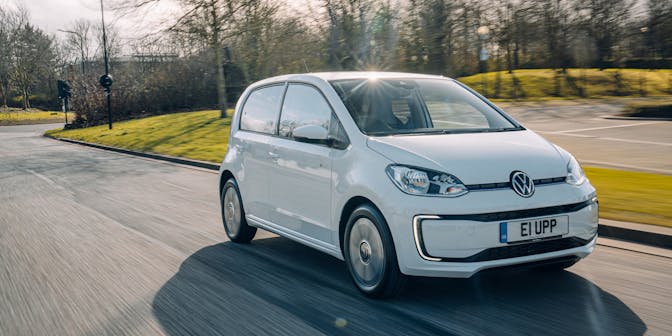
Kia EV6
- £3,930.99 Initial rental (ex. VAT)
- £4,717.19 Initial rental (inc. VAT)
- 48 Month term
- 5000 Annual mileage
- Subject to status and conditions + arrangement fee
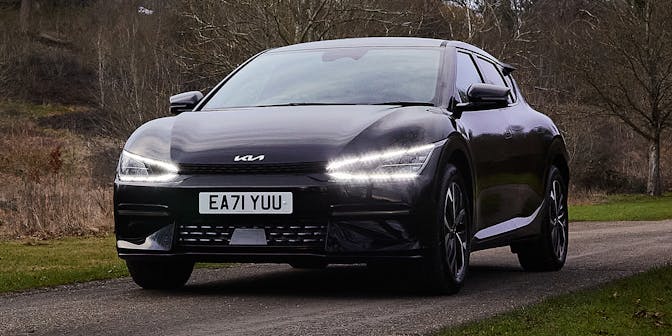
Tesla Model Y
- £3,669.83 Initial rental (ex. VAT)
- £4,403.80 Initial rental (inc. VAT)
- 48 Month term
- 5000 Annual mileage
- Subject to status and conditions + arrangement fee
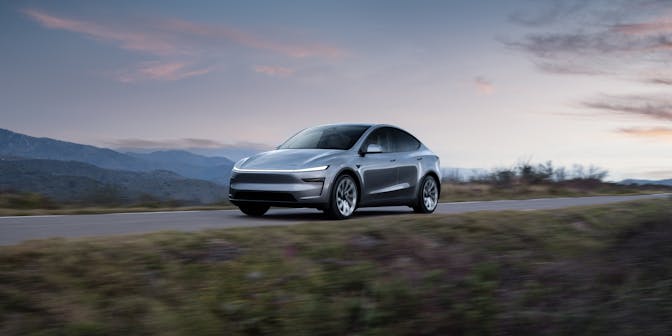
Public charge networks have their own different charging models, most based on the same pence per kWh. This makes it easy to compare public charging costs against different networks and compared against charging at home.
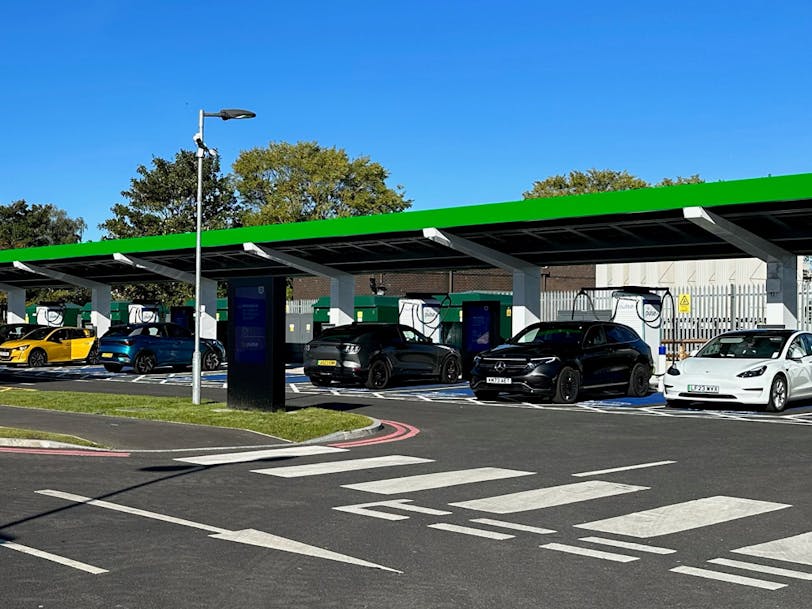
Some operators allow for a simple 'tap and go' approach to payment where your bank card is used to enable and pay for a charge, while other providers ask you to have an account before enabling the charger.
Our advice is always to plan ahead and ensure that you can access the public chargers you're planning to use.
Example public charge costs
Data checked: November 2023
- Osprey
-
79p
per kWh
- Instavolt
-
85p
per kWh
- bp pulse
-
57p to 85p
per kWh
Why doesn't my electric car charge faster?
Not all electric vehicle are capable of charging at the same speed of charging, for example; The Volkswagen e-golf has a max Charging speed of 40kW – so it will take the same amount of time to charge on a 50kW, a 150kW or a 350kW hour charger.
A good rule of thumb is that the newer the electric vehicle, the higher capacity it can handle. Newer Volkswagen ID models, such as the ID.4 or ID.5 can handle over 100kW of power. The Kia EV6 can take up to 233 kW of power, making it one of the fastest charging electric car available today, under the right conditions the EV6 battery can go from 20% to 80% charge in only 16 minutes.
But these fast charge max power figures that doesn't tell the whole story, other variables at play include how warm the car battery is, for optimal charging the battery should be warm and not cold. The existing charge in the battery also impacts charging speed, as all carmakers use sophisticated technology to protect the battery from overuse.
Finally, the public charging site will have a maximum load capacity, so if you're using a busy hub site then you might experience a charge rate under the advertised rate.
It is worth noting that given all these variables, an electric car driver will often find the same public charging location will provide a different amount of power to the vehicle each and every time it is used.
Example maximum charge capacities
- Kia EV6
-
233 kW
Max. charge speed (DC)
- Tesla Model Y Long Range
-
210 kW
Max. charge speed (DC)
- Volkswagen ID.4
-
135 kW
Max. charge speed (DC)
- MINI
-
49 kW
Max. charge speed (DC)
Can you charge your electric car for free?
Sometimes, yes. But these locations are now few and far between. And should you really expect to fuel up for free? We don't think so.
Some UK visitor attractions can offer reduced cost charging to make your visit stress-free - and can offer a fix priced for as much energy as you need while you're having fun at the venue.
Our recommendation is to always check with the attraction's website to see whether they provide chargers and how to access them.
Are there enough charging stations for electric cars?
As of the end of October 2023, the UK had over 30,000 charging locations, offering more than 79,000 connectors. Hundreds are being installed every month, with the 15 largest networks accounting for over 75% of all points.
There are now more EV charging locations than petrol stations in the UK, while you can use Zap-Map to find on-the-go chargers, plan your routes and ensure you have the correct connector type, and pick out free charge points - if you can find them!
There’s a handy downloadable app that is highly recommended for new and experienced EV drivers alike.
Our electric car lease special offers...
Ford Explorer 125kW Style 52kWh 5dr Auto
- £2,631.13 Initial rental (ex. VAT)
- £3,157.36 Initial rental (inc. VAT)
- 48 Month term
- 5000 Annual mileage
- Subject to status and conditions + arrangement fee
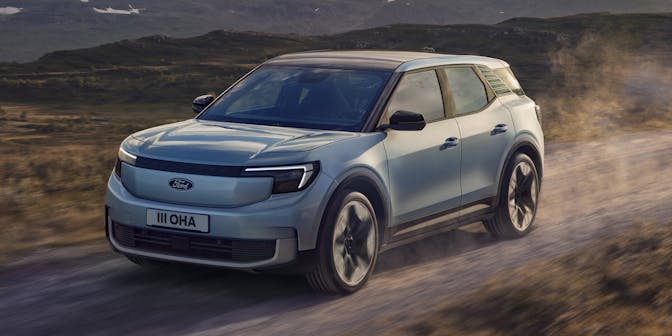
Tesla Model 3 RWD 4dr Auto
- £2,420.28 Initial rental (ex. VAT)
- £2,904.33 Initial rental (inc. VAT)
- 48 Month term
- 5000 Annual mileage
- Subject to status and conditions + arrangement fee
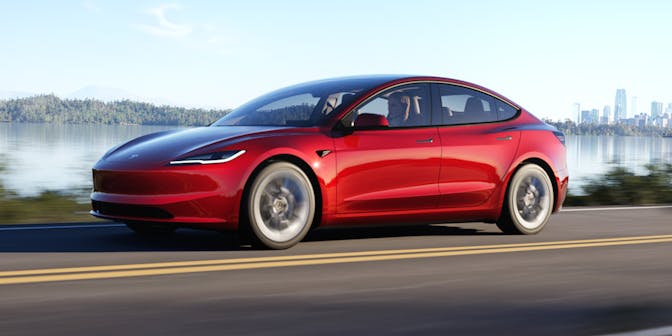
Tesla Model Y Standard Range RWD 5dr Auto
- £3,669.83 Initial rental (ex. VAT)
- £4,403.80 Initial rental (inc. VAT)
- 48 Month term
- 5000 Annual mileage
- Subject to status and conditions + arrangement fee

More great EV guides
6 surprising things you didn’t know about electric vans
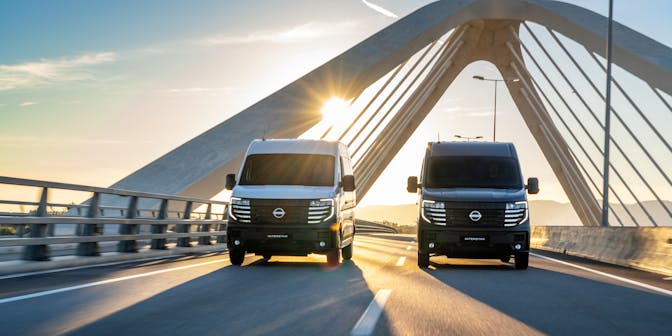
Understanding Vehicle Excise Duty (VED) or "Road Tax" for EVs
How to save money on a new car with Salary Sacrifice
